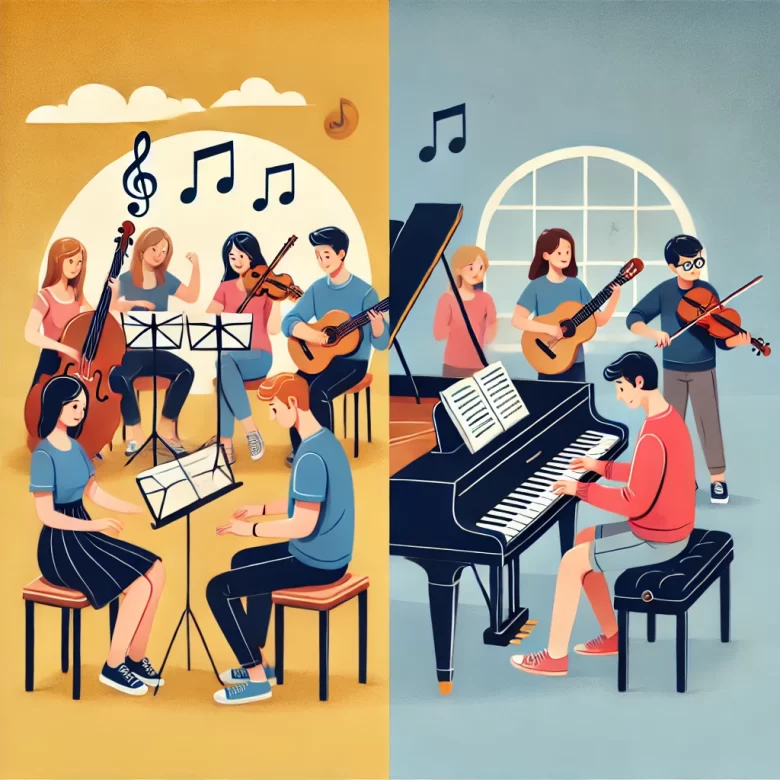Starting to learn music is a thrilling step, but choosing the right learning format can feel overwhelming. Should you sign up for group classes or invest in private lessons? Each path offers unique advantages. The best option depends on your personality, goals, schedule, and budget.
This guide will help you weigh the pros and cons of both so you can make a confident decision.
The Dilemma: Group Classes or Private Lessons?
Music education is no longer one-size-fits-all. Beginners today have more choices than ever before, with in-person and online options, hybrid models, and styles tailored to individual needs.
Group classes and private lessons are two of the most common formats. Understanding how each works is the first step toward making the right choice. Each format can lead to success when aligned with the learner’s preferences and lifestyle.
Benefits of Group Music Classes
Group classes are ideal for learners who thrive in community-based settings. Here are some of the key advantages:
- Social interaction: Learn with peers, share experiences, and build friendships.
- Motivation boost: Progressing alongside others can push you to stay consistent.
- Ensemble skills: Playing or singing with a group helps develop listening and coordination.
- Performance practice: Many group classes include recitals or group performances.
- Cost-effective: Usually more affordable than private lessons.
Group classes are especially great for young learners and extroverted personalities who enjoy teamwork and social environments.
Advantages of Private Music Lessons
Private lessons offer a personalized, focused approach to learning. Some of the main benefits include:
- Individual attention: Your teacher tailors the lesson to your strengths and weaknesses.
- Faster progress: Customized pacing helps you improve more efficiently.
- Flexible scheduling: You can often set your own lesson times.
- More depth: Explore topics that interest you at your own pace.
- Privacy and comfort: Less pressure from peers, ideal for shy learners.
Private lessons are perfect for those who prefer one-on-one attention or who have specific musical goals, such as preparing for auditions or certifications.
Which Option Suits Your Learning Style?
Ask yourself these questions:
- Do I enjoy collaborating and learning with others?
- Am I self-conscious when learning something new?
- Do I need personal feedback to stay on track?
- Do I prefer structure or flexibility?
If you enjoy group dynamics and shared experiences, classes might suit you better. If you value tailored feedback and personal space, private lessons may be ideal.
Also consider how you handle feedback. In group settings, feedback is often generalized. In private lessons, it’s direct and specific.
Budget and Time Considerations
Your available time and finances will likely influence your decision:
- Group classes: Lower cost, fixed schedule.
- Private lessons: Higher cost, flexible schedule.
Also, think about your availability. Are you juggling work or family responsibilities? Private lessons might offer more scheduling freedom.
Some group classes meet only once a week, which can be limiting for rapid progress, but they’re great for social learners or those on a tighter budget.
Progress and Feedback: What to Expect
In group settings, feedback may be less frequent or general, especially if class sizes are large. Progress is often paced to match the group, which can be either encouraging or frustrating depending on your pace.
In private lessons, feedback is immediate and specific. Your teacher tracks your growth closely and adjusts lessons accordingly. You’ll likely advance faster with consistent one-on-one guidance.
Hybrid Learning: The Best of Both Worlds?
Some learners thrive by blending both approaches. For example:
- Weekly group classes + monthly private check-ins
- Private lessons + ensemble participation
This hybrid model combines the personalized depth of private lessons with the social and performance benefits of group interaction.
Many schools and platforms now offer flexible programs that mix these formats. You might start in a group and move to private lessons later — or vice versa.
Tips for Choosing What’s Best for You
- Define your goals: Are you learning for fun, performance, or a specific skill?
- Consider your schedule: Consistency matters more than duration.
- Assess your comfort level: Do you learn better solo or with others?
- Try both formats: Many schools offer intro classes or trial lessons.
- Talk to teachers: Good instructors will guide you toward the right format.
- Think long term: What fits your life today might evolve later. Stay open to change.
Real-Life Stories: What Beginners Say
- “Group classes helped me get over my fear of playing in front of people. I learned to listen and collaborate, which made music more fun.”
- “I switched to private lessons and my progress skyrocketed. Having my teacher focus only on me helped me build confidence and improve faster.”
- “Doing both gave me structure and freedom. I love jamming with my group but also value my quiet time to refine techniques in private sessions.”
These stories show there’s no one-size-fits-all answer. Each journey is personal.
Final Thoughts: Your Learning, Your Way
Whether you choose group classes, private lessons, or a mix of both, the most important thing is to stay engaged and enjoy the journey. Each format has value, and the best choice is the one that aligns with your learning style and life circumstances.
Music is a personal path. Choose the route that resonates with you — and let your learning begin. Don’t be afraid to experiment, adjust, and make it your own. Your music journey is unique — just like you.

